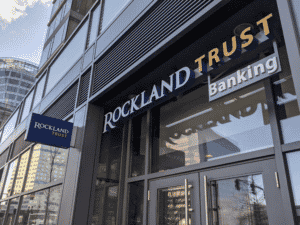Rockland Trust’s CEO Christopher Oddleifson looked to the example of his predecessor when he decided not to remain on Rockland Trust’s board of directors following his retirement as CEO.
Rockland Trust announced earlier this month that Oddleifson would step down as CEO in February and leave the board when his term expires in May. Oddleifson will remain with the bank in an advisory role throughout 2023.
In his final quarterly earnings call with analysts on Friday, Oddleifson said there was “no mystery” to his decision to retire, noting the customary succession planning that the bank’s independent directors had undertaken.
“The decision to retire was mine,” Oddleifson said during the call. “I am healthy and well, and after two decades just felt it was time to pass the baton to someone else to lead the next phase of our growth and long-term success.”
Joining Rockland Trust as its new CEO will be Jeffrey Tengel, People’s United Bank’s president before the Connecticut-based bank was acquired by M&T Bank last year. Tengel will take over as the bank’s leader on Feb. 6.
Oddleifson joined Rockland Trust as CEO in 2003, and since 2008, the bank has made 10 acquisitions. In response to an analyst’s question about the bank’s future for mergers and acquisitions given the CEO change, Oddleifson said one of his first tasks with Tengel would be to outline Rockland Trust’s history with acquisitions and why the bank has been successful. He added that he had “a high degree of confidence” that Tengel would be receptive to the bank’s M&A strategy.
The dwindling number of banks has meant that deals happen more randomly rather than as a continuous flow, Oddleifson said, adding that he does expect the M&A to continue. Oddleifson also noted that he would respond to any calls he received about possible deals in his remaining days as CEO.
Rockland Trust had 2022 fourth quarter net income of $77.04 million, or $1.69 per diluted share, compared to 2022 third quarter net income of $71.9 million, or $1.57 per diluted share. The bank attributed the higher net income to net interest margin expansion, loan growth and higher fee income. The bank in the fourth quarter of 2021 had acquired East Boston Savings Bank, its largest acquisition.
The bank’s full year net income was $263.8 million, or $5.69 on a diluted earnings per share basis, compared to $120.99 million, or $3.47 on a diluted earnings per share basis, in 2021.
Total assets at the end of 2022 were $19.3 billion down 2.1 percent from Sept. 30 and 5.5 percent compared to Dec. 31, 2021. The bank attributed the drop primarily to declining cash balances.
Rockland Trust’s total loans at the end of the fourth quarter were $13.9 billion, up $228.3 million from the third quarter. Deposits totaled $15.9 billion at the end of 2022, down 2.8 percent from Sept. 30.
In response to an analyst’s question about why he chose not to remain on the board, Oddleifson said he was taking the same approach as his predecessor, Doug Philipsen.
“He was not in the boardroom where directors, quite frankly I think, given his reputation, would be looking at him every time I said something and just sort of saying, ‘Well, Doug, what do you think about this?’” Oddleifson said. “And I think I need to do that same thing for Jeff.”
Oddleifson added that he would continue to be available for the bank.
“I still will, despite not being on contract or on payroll, will be representing Rockland Trust in the marketplace with my community activities,” he said. “The association of Chris Oddleifson and Rockland Trust is still going to be there.”







